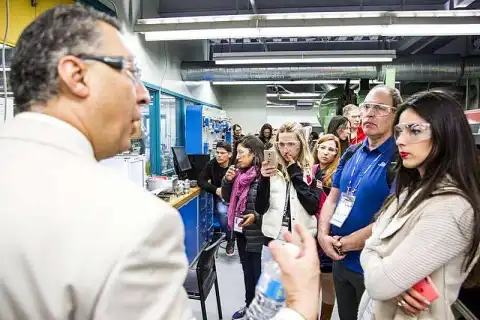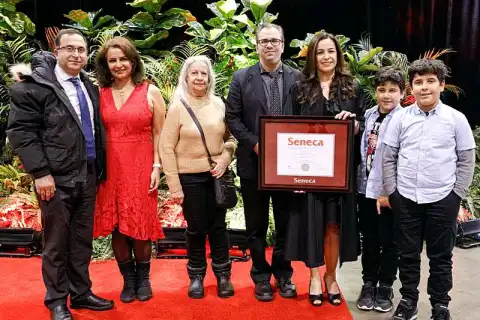Advanced Diploma - Civil Engineering Technology
- 3 years
- Duration
- 17,845 CAD/year
- Price
- Rolling admission
- Start
- Rolling admission
- Deadline
- Diploma
- Degree
- Mixed
- Format
- Toronto / Canada
- Location
Program description
This course is perfect for you if you've always wanted to play a role in shaping the built world.
This three-year advanced diploma program will teach you the fundamentals of civil engineering, including highway, city, and building construction, geotechniques, soil mechanics, the building code, and surveying. AutoCAD, MicroSurvey, Civil 3D, ArcGIS, and other cutting-edge software with niche applications in construction, municipal planning, and transit are just some of the programs you'll become proficient in. Capstone projects and technical reports developed individually and collaboratively near the program's conclusion will demonstrate the full range of knowledge and abilities you've gained.
The CVT curriculum emphasizes real-world application of theoretical concepts in the field of civil engineering. Indoor and outdoor laboratory participants will need to wear PPE and other industry-standard safety gear to simulate real-world conditions. In addition, you'll likely need to do some heavy lifting of tools and materials, and you'll likely have to work in a variety of weather and environmental conditions outside.
Program structure
Semester 1
- CAD Fundamentals or
- Communicating Across Contexts or
- Communicating Across Contexts (Enriched)
- Engineering Problems and Statics
- Environmental Science
- Mathematics 100
Semester 2
- Civil CAD Drafting II
- Interpersonal Skills in the Engineering Workplace
- Mathematics II
- Materials
- Strength of Materials
- Surveying I
Semester 3
- Geographic Information Systems
- Geotechniques or
- Introductory Calculus or
- Introductory Statistics
- Structural Design - Steel
- Surveying II
- Technical Communications
- Work Term Preparation (Work-Integrated Learning option only)
Work-Integrated Learning Term 1
- Civil Engineering Technology, Co-op (Work-Integrated Learning option only)
Semester 4
- Hydraulics and Hydrology
- Highway Technology
- Soil Mechanics and Foundations
- Structural Design - Concrete
- plus: General Education Course
- plus: General Education Course
Work-Integrated Learning Term 2
- Civil Engineering Technology, Co-op II (Work-Integrated Learning option only)
Semester 5
- Building Code
- Building Science Technology
- Engineering Technical Report I
- Municipal Technology
- Planning
- Building Information Modeling (B) or
- Civil Design Application (M) or
- Traffic Engineering Technology
Semester 6
- Construction Management
- Engineering Technical Report II
- Building Design (B) or
- Municipal/Environmental Design (M) or
- Road Design and Operation for Vulnerable Users
- Structural Design - Wood (B) or
- Water Management Control (M) or
- Transportation Planning Technology
- plus: Professional Option Course
Professional Options
- Applications in Project Management
- Building Envelope Systems
- Concrete Detailing Modeling
- Engineering Ethics and Professional Practice
- Rehabilitating the Built Environment
Price
Tuition fees - 17,845 CAD/year
Books and Supply Costs - 1,750 CAD
Please note: All costs are approximate, may vary by campus and are subject to change at any time without notice.
Requirements for applicants
Academic Requirements:
- Transcripts from high school for grades 10, 11, and 12 that include all prerequisite classes for the program.
- A high school or postsecondary degree (certificate of completion).
- Transcripts or certificates for any university or tertiary college courses or programs you have finished, whether they were taken domestically or abroad, may be submitted.
- An official/certified English translation must be included with any academic records that are written in a language other than English.
At any moment, Seneca has the right to check submitted transcripts. Seneca maintains the right to ask for authentic transcripts to be delivered directly to Seneca from the issuing school for courses and certificates obtained inside Canada. If such action is required, applicants will be informed.
English Proficiency Requirements:
If English is not your first language, show one of the following:
- Minimum of two years full-time study in an English-speaking nation
- Minimum one year of full-time postsecondary education in an English-speaking nation
- Successful completion of an intense English program like the English Language Institute
- English proficiency exam results from one of the international testing agencies. Only two-year-old tests are valid.
English language test score requirements
- CAEL CE and CAEL online - Minimum 60
- Cambridge English Exams (B2 First/FCE, C1 Advanced/CAE or C2 Proficiency/CPE) - Minimum 169 with no skill below 162
- Duolingo - Minimum score 105 to 110
- IELTS Academic - Minimum 6.0 with no skill below 5.5
- PTE Academic - Minimum score 58
- TOEFL iBT (including MyBest TOEFL and Home Edition) - Minimum 80 with no skill below 20
- TOEFL Revised Paper Delivered - No skill below 20
About the university

A public institution with many campuses in Peterborough, Ontario, and the Greater Toronto Area is called Seneca College of Applied Arts and Technology. At the bachelor, diploma, certificate, and graduate levels, it provides both full-time and part-time programs.
Seneca has been involved in foreign education for many years and today draws over 10,000 students from over 130 different nations each year. Through intense language instruction that may last anywhere from two months to more than a year, Seneca's English Language Institute helps overseas students become ready for post-secondary education. The college has a number of alliances with schools abroad and is growing its efforts in collaborative applied research and work/study abroad opportunities.
Seneca in a Nutshell
- With 30,000 full-time students and more than 70,000 registrations for continuing education each year, this institution is among the biggest in Canada.
- 7,000 foreign students from more than 150 nations make up a diversified student body.
- In terms of connections to other postsecondary institutions, Ontario colleges rank first.
- In Toronto, York Region, and Peterborough, there are ten campuses.
- Every year, on average, 8,000 bursaries and 2,600 Seneca scholarships/awards are given out.





